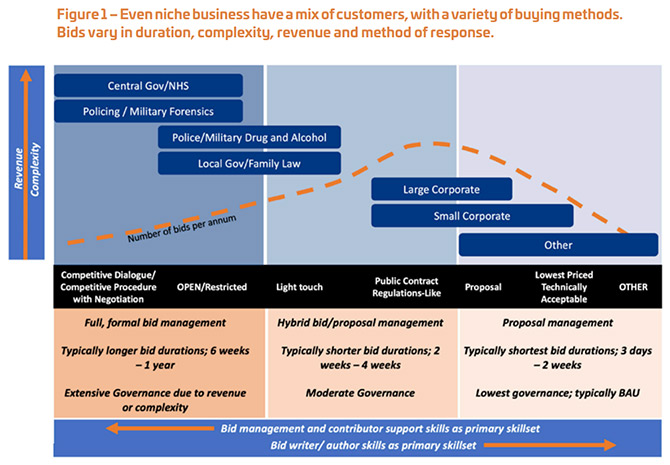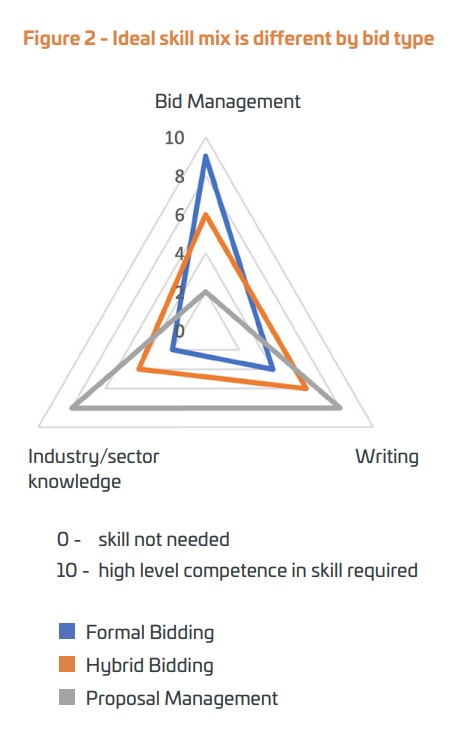
Recruiting bid managers in niche sectors can be a formidable challenge. The scarcity of qualified candidates and technical proficiency and industry knowledge requirements all contribute to the difficulty of finding the perfect fit. However, there’s an improved chance of finding the ideal candidate with consideration of cultural fit and some adaptability of the organisation’s recruitment and decision-making processes.
It is becoming common to tightly define bid roles, especially in larger bid teams. Some organisations can differentiate between ostensibly similar roles to create teams of astonishing breadth and depth, and many now specify prior industry experience in recruitment adverts alongside bid competencies. Less mature industries, smaller organisations or (as in my case) a niche industry with a broad span of bidding types within the single organisation face a different challenge; one that requires looking past technical skills to resolve.
Forensic Science is the niche sector I work in. However, as in many industries, the real breadth of the organisation is only revealed when you look behind that descriptor. Forensic Science is any science relating to courts of law. Within my organisation we do all the classic forensic science work (with specialists in disciplines as varied as DNA, toxicology, and document reconstruction) and also undertake work for civil law purposes (including paternity and drug/alcohol testing for workplaces).
Forensic markets are not homogeneous and buyers of each of those services buy differently. For example, police and military customers follow a full, lengthy, formal procurement (workplace testing, often very short turnaround, proposal based) with a tranche of customers in the middle. Volumes of bids for the large procurements are low; churn of the small proposals is high. Figure 1 shows an overview of the environment in which we operate.

To define the problem:
- There is a limited pool of qualified candidates with both forensic knowledge and bid management skills.
- The art and science of proposal writing has different emphases to that of large-scale public-sector procurement. Figure 2 shows the ideal mix by bid type.
- Budgetary (or organisational) constraints make hiring multiple staff a non-starter.

So, with the problem expressed, what can we do? Compromise is required if the organisation isn’t large enough or sophisticated enough to segregate duties by bid type. With assessment on purely technical grounds, the sensible choice would be to simply pick someone capable of the hybrid model who can do a bit of everything. That’s an easy decision and represents a ‘good enough’ option, but not the best.
Looking long term, beyond ‘good enough’ to cultural fit, development and support
Looking beyond immediate demonstration of technical skills presents options for niche businesses. This approach also requires compromise (and management willing to consider support and development) but there are some simple, perhaps even obvious, ways to improve the odds from ‘good enough’ to ‘best’. I’ve applied all the points below and have developed some of my best bid managers from ‘non-standard’ applicants.
Assess behaviours and cultural fit at interview, not just background and technical skill. Although challenging, this can help ensure a good match and prevent an early exit when you and the candidate find out you’re not good matches for each other. For example:
- Irrespective of technical competence, if you need cross-function flexibility and your candidate is happiest in a very formally constrained role, it may not be a perfect match…and vice versa. This was a very hard lesson for me to learn.
- Check their approach to people management matches yours (and the company’s). If you and your new bid person both approach your SMEs and stakeholders the same way and with the same voice, it limits options for disconnect and ensures a smoother ride.
Work out whether a technical gap can be filled by training.
- If you need a particular bid skillset and an otherwise excellent candidate doesn’t have it, can it be trained in? How long would it take? Would it need to be internal or external?
- Lack of sector knowledge is not necessarily a deal breaker. Consider a 100-day plan to expand sector and company internal knowledge rather than discarding a potentially ‘best’ candidate for lack of these. If this candidate stays for years, technical knowledge is something that will be acquired.
Work out whether a technical gap can be resolved by software, a system or a process.
- This might be the perfect time to consider making your proposals more ‘self-serve’ so that subject matter experts with customer and technical knowledge can produce better content without leaning so heavily on a bid team.
- Conversely, this might be the time to redraft and reissue your bid management Standard Operating Procedures (SOPs) so your new person can learn whilst doing and can understand the nuances between the approaches for different bid types.
Companies looking for a very specific fit for a well-defined role, with a wide pool of potential applicants can (and probably should) include sector knowledge as part of their hiring criteria. The shallower the learning curve, the quicker the bid team can deliver at its optimum…but even those teams should look wider and consider cultural fit and compromise to ensure they get the best long-term prospect, not just one that’s good enough for today. Those of us in niche sectors should use cultural fit and compromise as a standard part of our hiring practices, looking beyond immediately evaluable technical skills to the developed future contribution of the bid people we hire. Evaluate how you hire and the criteria you hire on or you may be missing star potential.
This article was written by Paul Harding.
Paul has over 25 years’ experience in work-winning roles, almost 20 of which are in bidding. He is currently Head of Group Tendering with Eurofins Forensic Services, part of the world’s largest Testing, Inspection and Certification Group. He combines his expertise in bidding into corporate customers and the public sector with his scientific, commercial and legal qualifications to deliver high success-rate bids, with a particular focus on Policing and Defence customers. Paul has been an APMP member for over 10 years, achieving Professional certification and is a judge for APMP’s Annual awards. He is active in the APMP UK’s Rapport mentor programme, supporting bid professionals in their career progression and personal development journeys.

